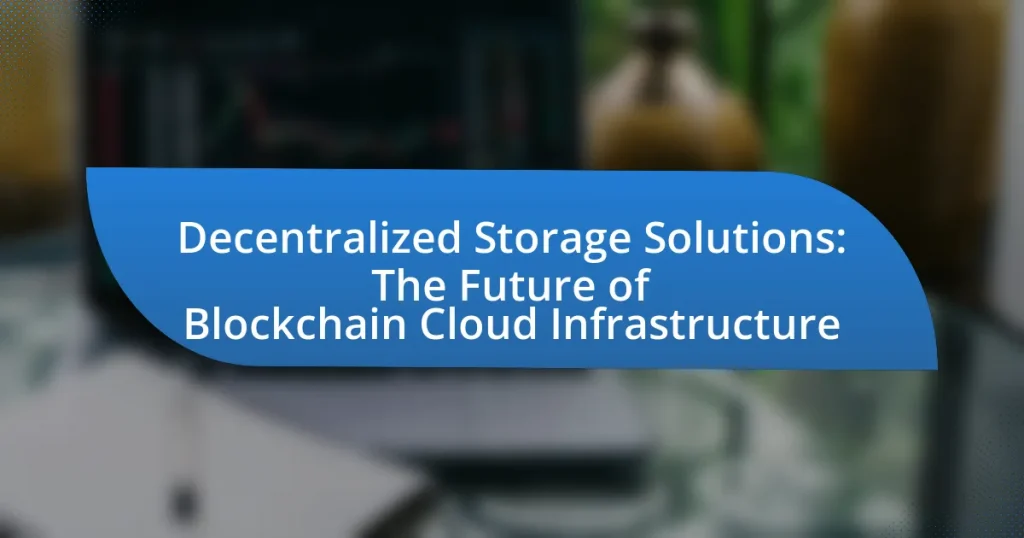Decentralized storage solutions represent a transformative approach to data management, utilizing a network of multiple nodes instead of relying on centralized servers. This architecture enhances data security, privacy, and availability while reducing operational costs and risks associated with data breaches. Key technologies underpinning these solutions include blockchain, peer-to-peer networking, and cryptographic protocols, which collectively promote user control over data. The article explores the differences between decentralized and traditional storage methods, the benefits of decentralization, potential applications across various industries, and the challenges and future trends in this evolving landscape.
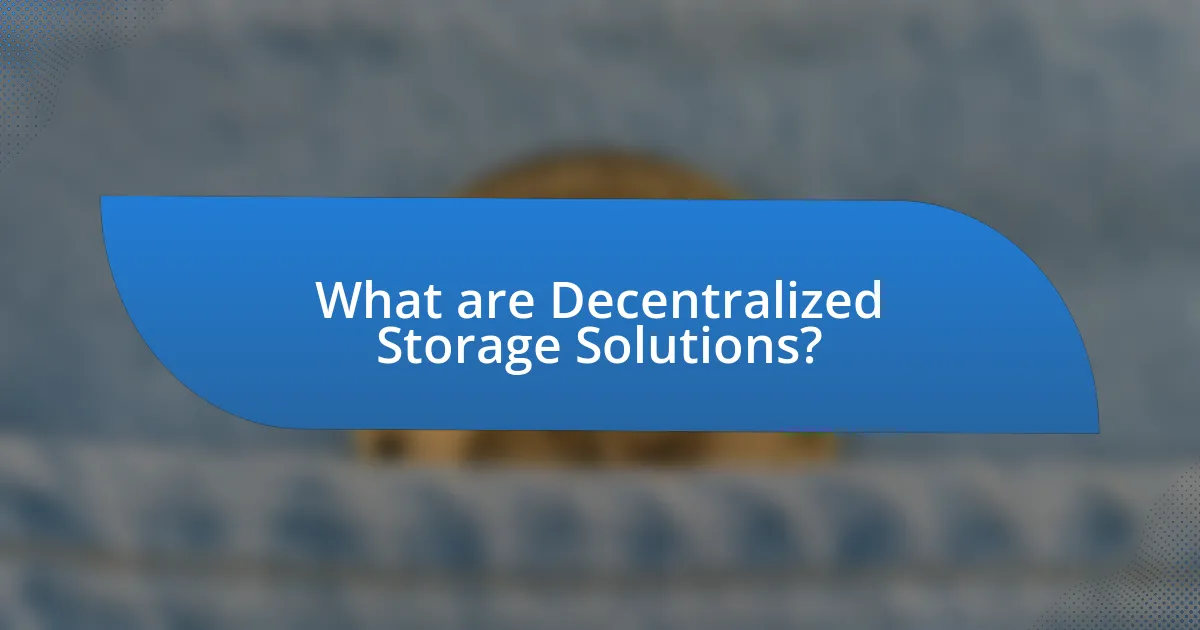
What are Decentralized Storage Solutions?
Decentralized storage solutions are systems that distribute data across multiple nodes in a network rather than relying on a single centralized server. This approach enhances data security, privacy, and availability by eliminating single points of failure and reducing the risk of data breaches. For instance, platforms like IPFS (InterPlanetary File System) and Filecoin utilize blockchain technology to ensure that data is stored in a distributed manner, allowing users to access and share files without relying on traditional cloud storage providers. The decentralized nature of these solutions also promotes user control over data, as individuals retain ownership and can manage access permissions directly.
How do Decentralized Storage Solutions differ from traditional storage methods?
Decentralized storage solutions differ from traditional storage methods primarily in their architecture and data management. Traditional storage relies on centralized servers, which create single points of failure and control, while decentralized storage distributes data across multiple nodes, enhancing redundancy and security. For instance, in decentralized systems like IPFS (InterPlanetary File System), files are stored in a peer-to-peer network, making it difficult for any single entity to manipulate or access all data. This structure not only improves data integrity but also reduces costs associated with server maintenance and downtime, as evidenced by studies showing that decentralized networks can lower operational expenses by up to 30% compared to centralized systems.
What technologies underpin Decentralized Storage Solutions?
Decentralized storage solutions are primarily underpinned by blockchain technology, peer-to-peer networking, and cryptographic protocols. Blockchain technology ensures data integrity and security through distributed ledgers, while peer-to-peer networking facilitates direct data sharing among users without a central authority. Cryptographic protocols enhance data privacy and security by encrypting files and managing access controls. These technologies collectively enable a resilient, secure, and efficient decentralized storage ecosystem, as evidenced by platforms like IPFS (InterPlanetary File System) and Filecoin, which utilize these principles to provide scalable storage solutions.
How do these technologies enhance data security?
Decentralized storage solutions enhance data security by distributing data across multiple nodes rather than storing it in a single location. This distribution minimizes the risk of data breaches, as compromising one node does not grant access to the entire dataset. For instance, blockchain technology employs cryptographic techniques to secure data, ensuring that any alterations are easily detectable and traceable. Additionally, decentralized systems often utilize consensus mechanisms, which require multiple parties to validate transactions, further safeguarding against unauthorized access and tampering. These features collectively create a robust security framework that significantly reduces vulnerabilities associated with traditional centralized storage systems.
Why are Decentralized Storage Solutions important for the future?
Decentralized storage solutions are important for the future because they enhance data security, privacy, and accessibility while reducing reliance on centralized entities. By distributing data across multiple nodes, these solutions mitigate risks associated with data breaches and single points of failure, as evidenced by the increasing number of high-profile data breaches in centralized systems. Furthermore, decentralized storage empowers users with greater control over their data, aligning with the growing demand for privacy in the digital age. According to a report by Gartner, by 2025, 75% of organizations will be using decentralized storage solutions to improve data management and security, highlighting their critical role in the evolving landscape of cloud infrastructure.
What challenges do traditional storage solutions face?
Traditional storage solutions face several significant challenges, including scalability, data security, and high operational costs. Scalability issues arise as data volumes increase, making it difficult for traditional systems to efficiently manage and store large datasets. Data security is a critical concern, as centralized storage systems are more vulnerable to breaches and unauthorized access, with reports indicating that 60% of small businesses that experience a data breach go out of business within six months. Additionally, high operational costs stem from the need for extensive hardware and maintenance, which can lead to increased expenses over time. These challenges highlight the limitations of traditional storage solutions in the context of evolving data needs and security threats.
How can Decentralized Storage Solutions address these challenges?
Decentralized storage solutions can address challenges such as data security, availability, and control by distributing data across multiple nodes rather than relying on a single centralized server. This distribution enhances security, as data is encrypted and fragmented, making unauthorized access significantly more difficult. Additionally, decentralized storage increases availability; if one node fails, others can still provide access to the data, ensuring continuous service. Furthermore, users retain greater control over their data, as they can manage permissions and access without relying on a central authority. These features are supported by blockchain technology, which provides a transparent and immutable ledger for tracking data transactions, thereby reinforcing trust and accountability in the storage process.
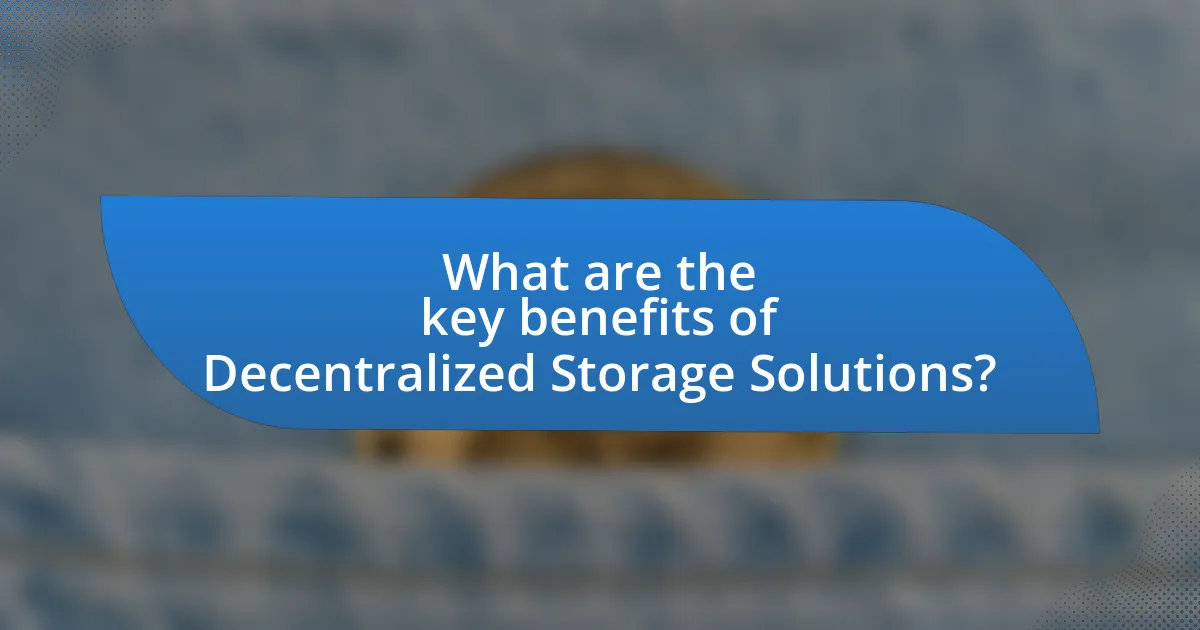
What are the key benefits of Decentralized Storage Solutions?
Decentralized storage solutions offer enhanced security, improved data availability, and reduced costs. These systems distribute data across multiple nodes, minimizing the risk of data breaches and ensuring that no single point of failure exists. For instance, a study by the International Journal of Information Management highlights that decentralized storage can reduce costs by up to 70% compared to traditional cloud storage, as it eliminates the need for centralized data centers and associated maintenance expenses. Additionally, decentralized storage enhances data redundancy, ensuring that files remain accessible even if some nodes go offline, which is crucial for maintaining continuous access to information.
How do Decentralized Storage Solutions improve data accessibility?
Decentralized storage solutions improve data accessibility by distributing data across multiple nodes rather than relying on a single centralized server. This distribution enhances availability, as users can access data from various locations, reducing the risk of downtime associated with server failures. For instance, platforms like IPFS (InterPlanetary File System) allow users to retrieve files from the nearest node, significantly speeding up access times. Additionally, decentralized storage mitigates the risk of data censorship and loss, as no single entity controls the data, ensuring that users can access their information freely and securely.
What role does redundancy play in data accessibility?
Redundancy significantly enhances data accessibility by ensuring that multiple copies of data are stored across different locations or systems. This approach mitigates the risk of data loss due to hardware failures, network issues, or other disruptions. For instance, in decentralized storage solutions, data is often replicated across various nodes, allowing users to access information even if some nodes are offline. This redundancy not only improves reliability but also facilitates faster access, as requests can be served from multiple sources, reducing latency. Studies have shown that systems employing redundancy can achieve higher availability rates, often exceeding 99.9%, thereby reinforcing the critical role redundancy plays in maintaining seamless data accessibility.
How does decentralization enhance user control over data?
Decentralization enhances user control over data by distributing data storage across multiple nodes rather than relying on a single central authority. This distribution allows users to retain ownership of their data, as they can manage access permissions and data sharing directly, without intermediaries. For instance, blockchain technology enables users to store their data in a secure, tamper-proof manner, ensuring that only they can modify or delete it. Research by the World Economic Forum indicates that decentralized systems can significantly reduce the risk of data breaches and unauthorized access, thereby empowering users with greater control and security over their personal information.
What cost advantages do Decentralized Storage Solutions offer?
Decentralized storage solutions offer significant cost advantages primarily through reduced infrastructure expenses and lower operational costs. By leveraging a distributed network of nodes, these solutions eliminate the need for centralized data centers, which typically incur high maintenance and energy costs. For instance, decentralized storage can utilize underutilized storage space on personal devices, effectively lowering the overall cost of data storage. Additionally, decentralized systems often employ a pay-as-you-go model, allowing users to only pay for the storage they actually use, further enhancing cost efficiency. This model contrasts with traditional cloud storage providers that often require fixed monthly fees regardless of usage, leading to potential savings for users.
How do operational costs compare to traditional cloud storage?
Operational costs for decentralized storage solutions are generally lower than those for traditional cloud storage. Traditional cloud storage often incurs higher costs due to vendor lock-in, data transfer fees, and infrastructure maintenance. In contrast, decentralized storage leverages a distributed network, reducing reliance on centralized servers and minimizing overhead costs. For instance, a study by the International Data Corporation (IDC) found that decentralized storage can reduce operational costs by up to 30% compared to traditional models, primarily due to lower data redundancy and improved resource utilization.
What factors contribute to the overall cost-effectiveness?
The overall cost-effectiveness of decentralized storage solutions is influenced by factors such as reduced infrastructure costs, enhanced scalability, and improved data security. Reduced infrastructure costs arise from the elimination of centralized data centers, allowing users to leverage distributed networks, which can lower operational expenses. Enhanced scalability is achieved through the ability to dynamically allocate resources based on demand, minimizing waste and optimizing resource utilization. Improved data security is provided by blockchain technology, which ensures data integrity and reduces the risk of costly breaches. These factors collectively contribute to a more efficient and economically viable storage solution compared to traditional centralized systems.
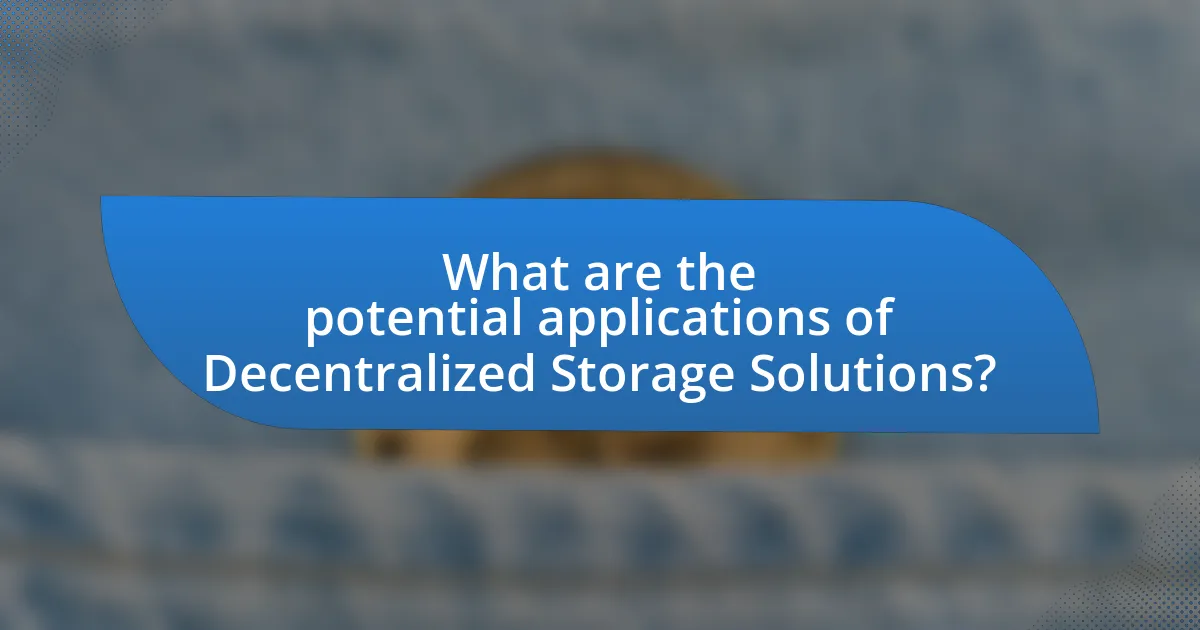
What are the potential applications of Decentralized Storage Solutions?
Decentralized storage solutions have potential applications in data privacy, content distribution, and secure data sharing. These solutions enable users to store data across a network of nodes, enhancing security and reducing reliance on centralized servers. For instance, decentralized storage can be utilized in healthcare to securely share patient records while maintaining privacy, as evidenced by projects like IPFS (InterPlanetary File System) that facilitate efficient content delivery. Additionally, decentralized storage can support the creation of decentralized applications (dApps) that require reliable and tamper-proof data storage, as seen in blockchain-based platforms like Filecoin, which incentivizes users to contribute storage space.
Which industries can benefit from Decentralized Storage Solutions?
Decentralized storage solutions can benefit various industries, including healthcare, finance, media and entertainment, supply chain management, and education. In healthcare, decentralized storage enhances data security and patient privacy by allowing sensitive information to be stored across multiple nodes rather than in a centralized database. In finance, these solutions provide increased security and transparency for transactions, reducing the risk of fraud. The media and entertainment industry can utilize decentralized storage for content distribution, ensuring that creators retain ownership and control over their work. Supply chain management benefits from improved data integrity and traceability, as decentralized systems can securely track products from origin to consumer. Lastly, in education, decentralized storage can facilitate secure sharing of academic resources and student records, enhancing collaboration while protecting sensitive information.
How can healthcare leverage Decentralized Storage Solutions for patient data?
Healthcare can leverage decentralized storage solutions for patient data by enhancing data security, improving patient privacy, and facilitating interoperability. Decentralized storage utilizes blockchain technology, which encrypts data and distributes it across a network, making unauthorized access significantly more difficult. According to a study published in the Journal of Medical Internet Research, blockchain can provide a secure and immutable record of patient data, ensuring that only authorized parties can access sensitive information. This approach not only protects patient privacy but also allows for seamless data sharing among healthcare providers, improving care coordination and patient outcomes.
What advantages do financial services gain from using Decentralized Storage Solutions?
Financial services gain enhanced security, improved data integrity, and reduced costs from using decentralized storage solutions. These advantages stem from the inherent characteristics of decentralized systems, which distribute data across multiple nodes, making it less vulnerable to breaches and single points of failure. For instance, a study by the World Economic Forum highlights that decentralized storage can significantly lower operational costs by eliminating the need for centralized data centers, which often incur high maintenance and infrastructure expenses. Additionally, the use of cryptographic techniques in decentralized storage ensures that data remains tamper-proof, thereby enhancing trust and compliance with regulatory standards in the financial sector.
How can businesses implement Decentralized Storage Solutions?
Businesses can implement decentralized storage solutions by adopting blockchain technology to distribute data across multiple nodes, ensuring data redundancy and security. This can be achieved through platforms like IPFS (InterPlanetary File System) or Filecoin, which allow businesses to store files in a decentralized manner. By utilizing smart contracts, companies can automate data management and access permissions, enhancing efficiency. Furthermore, integrating decentralized storage with existing cloud infrastructure can provide a hybrid solution that leverages both centralized and decentralized benefits, improving scalability and resilience. The effectiveness of decentralized storage is supported by the growing adoption of blockchain technology, which has seen a market increase from $1.5 billion in 2016 to over $60 billion in 2021, indicating a strong trend towards decentralized solutions.
What steps should organizations take to transition to decentralized storage?
Organizations should take the following steps to transition to decentralized storage: first, assess their current data storage needs and identify which data can be migrated to a decentralized system. This assessment helps in understanding the volume and type of data that will benefit from decentralization. Next, organizations should select a suitable decentralized storage solution, such as IPFS or Filecoin, that aligns with their requirements for security, scalability, and accessibility.
Following the selection, organizations must develop a migration plan that includes data transfer protocols, ensuring data integrity and security during the transition. Training staff on the new system is crucial to facilitate smooth adoption and usage. Finally, organizations should implement a monitoring system to evaluate the performance and reliability of the decentralized storage solution, making adjustments as necessary to optimize operations.
These steps are validated by the increasing adoption of decentralized storage solutions in various industries, demonstrating their effectiveness in enhancing data security and reducing reliance on centralized systems.
What best practices should be followed during implementation?
During implementation of decentralized storage solutions, it is essential to prioritize security, scalability, and user experience. Security measures should include encryption of data both at rest and in transit, as well as regular audits to identify vulnerabilities. Scalability can be achieved by utilizing modular architectures that allow for easy integration of additional nodes or resources as demand grows. User experience should focus on intuitive interfaces and seamless interactions to encourage adoption. These practices are supported by industry standards, such as the NIST Cybersecurity Framework, which emphasizes the importance of security in cloud environments, and successful case studies from companies like Filecoin, which demonstrate the effectiveness of scalable decentralized storage solutions.
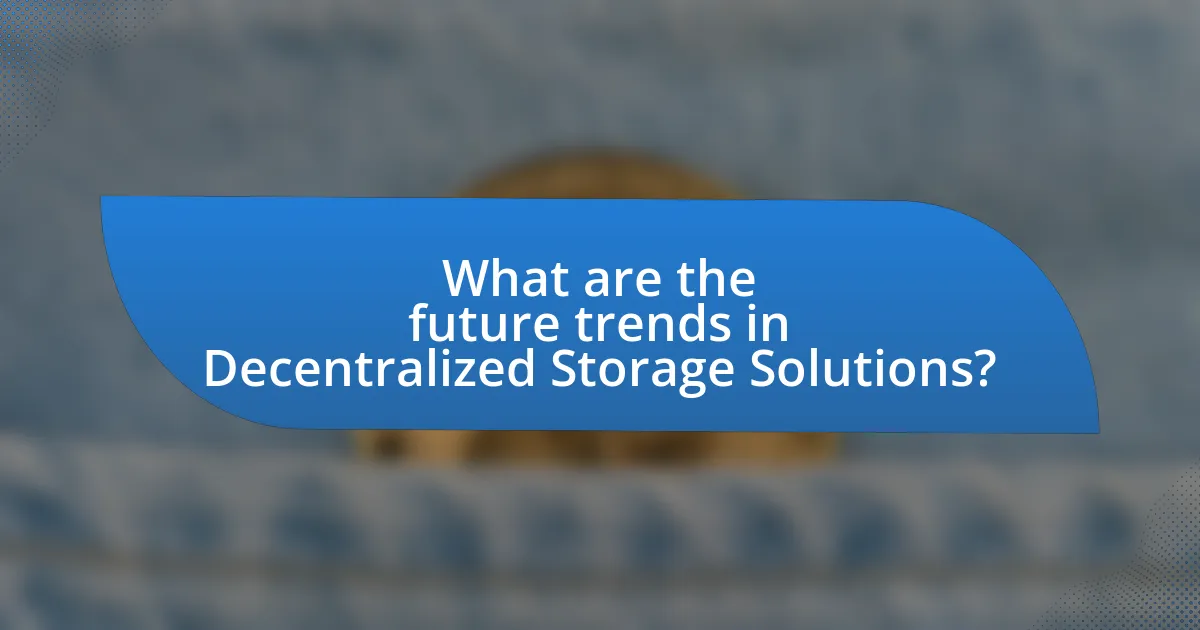
What are the future trends in Decentralized Storage Solutions?
Future trends in decentralized storage solutions include increased adoption of blockchain technology, enhanced data privacy, and the integration of artificial intelligence for data management. The rise of blockchain technology is driven by its ability to provide secure, tamper-proof storage, as evidenced by platforms like Filecoin and Storj, which utilize decentralized networks to store data. Enhanced data privacy is becoming crucial as users demand more control over their information, leading to solutions that encrypt data and allow users to manage access permissions. Additionally, the integration of artificial intelligence is expected to optimize data retrieval and storage efficiency, as seen in projects that leverage AI algorithms to analyze and manage decentralized data more effectively. These trends indicate a shift towards more secure, efficient, and user-centric storage solutions in the decentralized landscape.
How is the technology evolving in the decentralized storage space?
The technology in the decentralized storage space is evolving through advancements in blockchain integration, improved data redundancy, and enhanced security protocols. Blockchain technology enables decentralized storage solutions to provide immutable records and transparent data management, which increases trust among users. Additionally, innovations such as sharding and distributed file systems are enhancing data redundancy, allowing for more efficient storage and retrieval processes. Enhanced security measures, including encryption and decentralized identity verification, are also being implemented to protect user data from unauthorized access. These developments are supported by the growing adoption of decentralized applications (dApps) and platforms like IPFS and Filecoin, which demonstrate the practical applications of decentralized storage in real-world scenarios.
What innovations are on the horizon for Decentralized Storage Solutions?
Innovations on the horizon for decentralized storage solutions include advancements in interoperability, enhanced security protocols, and the integration of artificial intelligence for data management. Interoperability improvements will enable different decentralized storage platforms to communicate seamlessly, facilitating easier data transfer and access across networks. Enhanced security protocols, such as advanced encryption techniques and decentralized identity verification, will protect user data from unauthorized access and breaches. Additionally, the integration of artificial intelligence will optimize data retrieval and storage efficiency, allowing for smarter data management and reduced latency. These innovations are supported by ongoing research and development in blockchain technology and distributed systems, indicating a robust future for decentralized storage solutions.
How will regulatory changes impact the adoption of Decentralized Storage Solutions?
Regulatory changes will significantly influence the adoption of Decentralized Storage Solutions by either facilitating or hindering their integration into mainstream markets. For instance, favorable regulations that promote data privacy and security can encourage businesses to adopt decentralized storage, as seen in the European Union’s General Data Protection Regulation (GDPR), which emphasizes user control over personal data. Conversely, stringent regulations that impose heavy compliance burdens may deter organizations from utilizing decentralized systems due to perceived risks and complexities. The impact of regulations is evident in the varying adoption rates across jurisdictions; countries with supportive frameworks, like Switzerland, have seen higher adoption of blockchain technologies compared to those with restrictive policies.
What challenges do Decentralized Storage Solutions face moving forward?
Decentralized storage solutions face significant challenges moving forward, including scalability, data integrity, and regulatory compliance. Scalability issues arise as the demand for storage increases, requiring systems to efficiently manage and distribute large volumes of data across a decentralized network. Data integrity is another challenge, as ensuring that data remains unaltered and accessible over time is crucial for user trust. Additionally, regulatory compliance poses difficulties, as decentralized systems must navigate varying legal frameworks across jurisdictions, which can hinder adoption and operational efficiency. These challenges must be addressed to ensure the viability and growth of decentralized storage solutions in the future.
How can scalability issues be addressed in decentralized systems?
Scalability issues in decentralized systems can be addressed through techniques such as sharding, layer-2 solutions, and improved consensus algorithms. Sharding involves partitioning the network into smaller, manageable pieces, allowing parallel processing of transactions, which significantly increases throughput. Layer-2 solutions, like state channels or sidechains, enable transactions to occur off the main blockchain, reducing congestion and enhancing speed. Improved consensus algorithms, such as Proof of Stake or Delegated Proof of Stake, can also facilitate faster transaction validation compared to traditional Proof of Work systems. These methods have been validated by various blockchain projects, including Ethereum’s transition to Proof of Stake and the implementation of sharding in its roadmap, demonstrating their effectiveness in enhancing scalability.
What security concerns need to be managed in the future?
Future security concerns in decentralized storage solutions include data privacy, unauthorized access, and the integrity of stored information. As blockchain technology evolves, ensuring that sensitive data remains confidential while being stored across multiple nodes is critical. Unauthorized access can occur through vulnerabilities in smart contracts or user interfaces, necessitating robust authentication mechanisms. Additionally, maintaining the integrity of data against tampering or loss is essential, as evidenced by incidents where decentralized platforms faced hacks or data breaches, highlighting the need for continuous security audits and updates.
What practical tips can help users maximize Decentralized Storage Solutions?
To maximize Decentralized Storage Solutions, users should prioritize data redundancy, utilize encryption, and regularly monitor storage performance. Data redundancy ensures that multiple copies of data are stored across different nodes, enhancing reliability and availability. Utilizing encryption protects sensitive information from unauthorized access, which is crucial in decentralized environments where data is distributed. Regularly monitoring storage performance allows users to identify bottlenecks or inefficiencies, ensuring optimal use of the decentralized network. These practices are supported by the inherent design of decentralized systems, which emphasize security, reliability, and performance.
